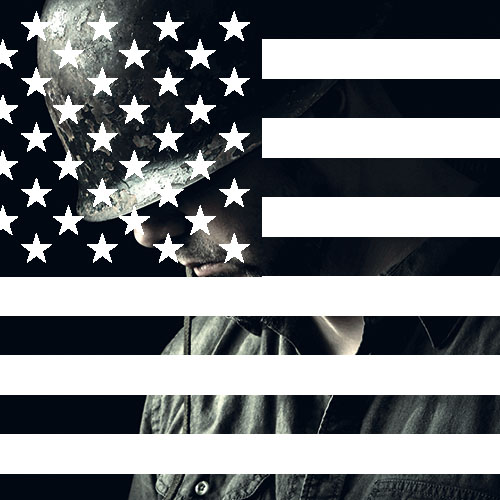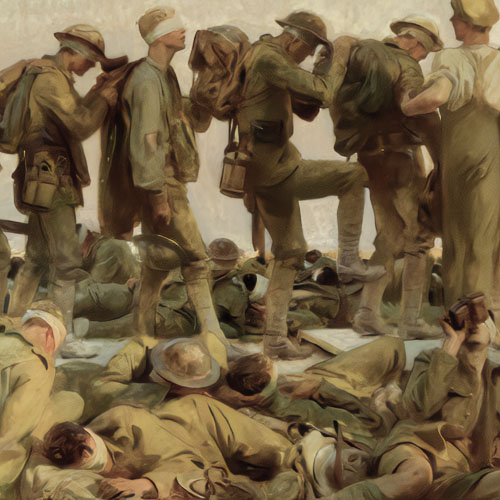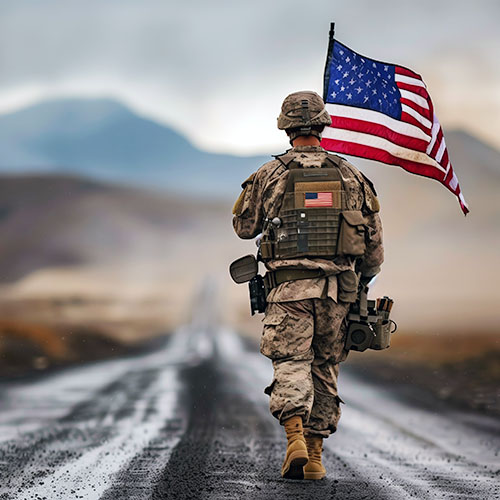A Military Memoir Unpacks the Brutal Truth About Deployment
Lauren Johnson: Combat Barbie Comes Clean
I couldn’t look away from the train wreck of Afghanistan,” admits Lauren Johnson, a former Air Force public affairs officer. “I’d been on the train. Maybe I’d even steered it.”
The Fine Art of Camouflage, Johnson’s new memoir, is a book about the stories a nation’s veterans — and parents and children — tell ourselves and each other when the truth is too painful to confront directly.
The pull toward military service is not solely the domain of weapons-dripping, musclebound men. Johnson inherited a call to serve from her mother, a nurse in the Army Reserves, who’d deployed to the Gulf War when Johnson was seven.
“Though I may not have enlisted to become a woman,” she acknowledges, “the woman I most loved and admired had done the same.”
Despite a subsequent family pact that no one else join the military “because one deployment was enough,” the twin lures of post-9/11 patriotism and a college ROTC scholarship enticed Lauren into an Air Force officer’s uniform and a job in public affairs — or military journalism. Having earned the nickname “Combat Barbie” in training (a pink paint round exploded all over her uniform), she deployed to Afghanistan in 2009 as part of a Provincial Reconstruction Team. There, her job involved information operations — creating media spin to frame the American war effort in a positive light.
On the surface, a Provincial Reconstruction Team leverages “soft power,” winning hearts and minds by delivering ambulances, immunizing children, teaching women about their rights and overseeing construction projects — all with an eye toward building public support for the government and disputing the insurgency’s claims to legitimacy. Initially, Lauren was an idealistic 25-year-old, but the longer she was deployed in Afghanistan, the more she observed redundant bureaucracy, seesawing goals and a Sisyphean struggle to measure so-called progress.
“Our operations in Afghanistan were based largely on theory, and wishful thinking,” she writes, as the Afghans expected the Americans to fund more projects than those for which time or money existed. Still, she was expected to help the war effort in the face of blunders. “If a military operation damaged property, if Americans faced blame for an attack, if a contractor abandoned a construction site or a government official failed to deliver on a promise to his citizens, I issued Band-Aids in the form of words.” She wanted to back the opinions she was offering to the Afghan public as she strove to influence their opinion, “to believe the promises we made on behalf of the Afghan government: security, education, health care, rule of law, all in exchange for ink-stained fingers on Election Day.”
Lauren Johnson writes a glowing op-ed praising the Afghan election in August 2009 — propaganda, she admits later — hyped up on the story lines she’d been feeding the Afghan populace and herself.
During her nine-month deployment, Lauren becomes skeptical about duplication of efforts and a lack of coordination between different units and agencies, the tension between the firehose of funding necessary to prop up a government and the need to account for it, and miscommunications in contingency planning. Her messages of hope and accomplishment soon ring hollow to her own ears, and her mix of anger and fear will be familiar to anyone who has also crouched in a bunker during missile attacks or raged at suicide bombers who’ve crashed base gates and threatened friends.
The tipping point for Johnson arrives after an attack on Camp Chapman — a base she’d previously visited — on Dec. 30, 2009, which killed members of another Provincial Reconstruction Team and obliterated what thin sense of her trust remained. In her information operations job, she also becomes privy to grisly photos of a mysterious execution-style killing of Afghan women. This confirms her jaded cynicism and makes her suspect her role sharing the “official” military message makes the war even worse.
Throughout, Lauren strives not to worry her family, just as her mother strove to keep messages home light nearly two decades before. Shielding her relatives from her stress, Johnson writes, “I sprinkled small truths around. No one knew the whole story.” The cultural tropes of warrior stoicism and a girlishly cheerful facade combine to assist her one-woman public affairs effort. Though Johnson is especially close with her parents, deployment experiences were as yet too taboo to be shared between mother and daughter. She writes, “I wanted my parents to trust in the rose-tinted version of my war.”
Even upon returning from deployment and running into her mother’s arms, Johnson strives to “act normal” on a base in Florida, all the while feeling alien, grieving recently lost friends, and reacting strongly to news items from Afghanistan. She feels the stark disconnect between relief at seeing her family and feeling jarred by how much has changed; her nieces’ births and brother’s 21st birthday can’t be relived, nor can time with her dying grandfather. This sense of whirring numbness — of gingerly padding around a home that doesn’t quite feel like home while being ambushed by grief at odd intervals — will be familiar to veterans of any generation, as will the half-truths she tells her family in attempts to keep them from worry.
It is only after drunkenly hitting bottom and seeking therapy that Lauren confesses the painful scars of her deployment to her parents, deciding in tandem to leave the Air Force at the end of her four-year contract. She and her mother “peel away the scar tissue together,” and Johnson learns of her mother’s Gulf War terror awaiting nightly scud missile attacks and taping windows against potential explosions on an assumed suicide mission, and later carrying trauma while “diving back into her roles as wife and mother and everything else we heaped on her.”
Returning from war in 1991, the elder Johnson was never encouraged to talk to anyone about her experiences. At the same time, she admits that it was harder for her to have a daughter deploy than for her to deploy herself.
The Fine Art of Camouflage is a new breed of memoir that traces war lineage through female generations. Now a mother of toddler twin girls, Lauren Johnson promises to tell them everything — and indeed dedicates her book to them — because they “deserve more than sound bites.”
In a world made of spin, veterans’ honesty about our war stories — even painful or shameful ones — can help us heal.
Teresa Fazio is a former Marine. Her book Fidelis is available now in paperback. You can get The Fine Art of Camouflage as well. Honestly, we would encourage it.






















